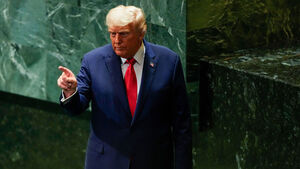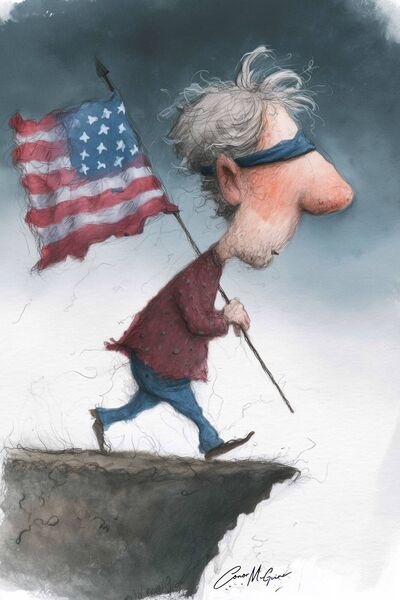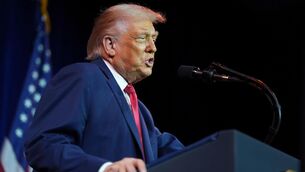American democracy is now on a cliff-edge

US President Donald Trump motions as he leaves after addressing the 80th session of the United Nations General Assembly last month. Picture: AP Photo/Yuki Iwamura
You know that moment at a dinner when someone's had too much wine and starts saying increasingly unhinged things, and everyone else develops a sudden fascination with their napkins? The decent thing would be to intervene, to gently suggest perhaps it's time to call it a night. But there's always that queasy paralysis, that hope that if you just ignore it, maybe they'll stop, maybe they'll realise, maybe someone else will deal with it. America is currently that dinner party, and Donald Trump has knocked over the claret and is now threatening to burn the house down. The other guests are still studying their napkins.
Eight months into Trump's sequel presidency, and America has the dazed quality of someone who's woken up in a skip wearing somebody else's trousers. The republic - that 250-year experiment in whether people can actually govern themselves without descending into chaos - is discovering that the answer might be no, actually, they can't, or at least not this lot, not right now. The hamburgers and optimism are still there, but they've acquired a distinctly queasy aftertaste.
The playbook isn't even particularly original. Send troops into your own cities. Claim there's a crisis that only you can solve. Ignore the law when it's inconvenient. Intimidate anyone who objects. It's Autocracy 101, the sort of thing you'd fail a first-year politics student for being too obvious about. Yet here we are, watching it unfold with the grim inevitability of a Netflix series you know will end badly but can't quite stop watching.
Los Angeles got the treatment first. Some 4,000 National Guard troops and 700 Marines, ostensibly to protect federal property from protesters who were upset about immigration raids. The local police chief said they didn't need help. The governor sued. The troops came anyway. It was the first time since the 1960s that the National Guard had been federalised without a governor's consent - a detail that should have set off every alarm bell in the constitutional fire station, but mostly just resulted in some strongly worded press releases and a few uncomfortable television interviews.
The funny thing about shows of force is that they're only impressive if you're impressed. A toddler throwing a tantrum only has power if the adults in the room panic. Trump understands this instinctively. He's spent his entire public life trading on the gap between perception and reality, selling the sizzle because he's never been much good at cooking the actual steak. The military deployments are theatre - expensive, dangerous and anti-constitutional, but theatre nonetheless.
We all know what Trump's doing. You'd need to be concussed not to see it. The interesting bit isn't his authoritarian shopping list - he's never been subtle about wanting to be a strongman, preferably with better lighting and his own military parade. What matters is whether Americans will shrug and let it happen. Whether they'll accept that certain people - those who look a certain way, speak a certain way, work certain jobs - should expect to be stopped and questioned by masked federal agents as a routine part of their day.
The Supreme Court has now effectively blessed this arrangement. In a ruling that would have made the founders weep into their powdered wigs, the court's Republican majority decided that yes, federal agents can absolutely stop you based solely on your ethnicity, your accent, where you work, or what you're doing. Justice Kavanaugh, in a bit of jurisprudence that will age like milk in the sun, suggested that the inconvenience to American citizens who get stopped is "modest" - they can simply prove they're citizens and be on their way. How wonderfully reasonable. Papers, please, but make it constitutional.
Justice Sotomayor, in dissent, pointed out what should be bloody obvious: this creates a whole category of Americans - citizens, born and raised - who now have to carry papers like it's occupied France to prove they're allowed to exist in their own neighbourhoods. But that's fine, apparently. That's the trade-off. A few million people get to live in a surveillance state so the rest of the country can nod along and pretend the government's doing something about... well, about something. The details don't really matter as long as it looks decisive.
The costs are difficult to ignore, though they're trying their best. The LA deployment alone cost at least $120 million, money that presumably couldn't have been used for anything frivolous, such as education or healthcare. Small businesses hemorrhage revenue as foot traffic disappeared. Students stopped going to school. People stopped going to the doctor. The vibrancy of one of America's great cities dimmed, replaced by the dull grey of fear.
Illinois Governor JB Pritzker, to his credit, told Trump where to stick his National Guard deployment.
"Do not come to Chicago," he said, with the kind of clarity that's become rare in American political discourse. "You are neither wanted here nor needed here."
Trump, faced with actual resistance, backed down. Or more accurately, he pivoted, as one does when one is both a bully and fundamentally weak. He'd send troops to Memphis instead - same show, different stage.
The Memphis mayor released a carefully worded statement that translated into something resembling mild dissatisfaction: "We'll cooperate, but we'd really rather have money for actual policing than troops as political props."
It was the desperate whimper of a Democratic mayor in a Democratic city carefully avoiding the spectre of his city transforming into a war zone.

This is where America finds itself - in a negotiation over which cities will accept military occupation. Let that settle in for a moment. The United States of America, land of the free, home of the brave, is having a national conversation about where the president should send federal troops to intimidate his own citizens. This is the stuff of banana republics and failing states, not the world's oldest continuous democracy.
The truly insidious thing about all this is how it's been normalised through sheer repetition and exhaustion. Trump posts 'Chipocalypse Now' on social media - a reference to a film about the madness of war, applied to an American city - and it barely registers. It's just another day, another threat, another demonstration that the rules don't apply, that the law is a suggestion, that constitutional protections are for other people.
Federalism - that creaky old American invention where states get to tell Washington to sod off - has suddenly become the only thing standing between democracy and whatever Trump's calling this week's power grab. Democratic governors are essentially playing goalkeeper against their own federal government, which is the sort of constitutional gymnastics nobody planned for. A generation ago, Republicans merrily defended states' rights. Now, they are perfectly happy watching federal troops march into Democratic cities, and the Democrats have discovered they're pretty fond of governors telling the White House to get lost. The whole thing's been turned inside out like some star-bangled sock.
Republicans, once the party of states' rights, now cheer as federal power is wielded against universities, media outlets, and cities. Democrats, once the party of federal intervention, now praise governors who refuse to cooperate with Washington.
The writer Timothy Snyder, filing his piece from Dnipro while Ukraine fights an actual invasion, noted the dark irony: America isn't being invaded by anyone except possibly itself. The missiles and drones threatening Ukrainian cities are real. The threat to American democracy is a choice.
And that's the thing that should terrify everyone. This isn't happening because it's inevitable. It's happening because people are letting it happen. Because they're tired, or scared, or convinced that it doesn't affect them personally, so why make a fuss? Because they've been told there's a crisis - crime, immigration, urban chaos - and they're willing to accept extraordinary measures to address it, even when the crisis is largely manufactured.
History teaches us that fascism doesn't arrive with jackboots and torchlight parades but is more incremental. It sneaks through with the slow erosion of norms, the gradual acceptance of the unacceptable followed by the collective shrug at things that would have been unthinkable just a year ago. It arrives when people decide that their neighbours being rounded up isn't their problem, that constitutional protections are negotiable depending on circumstances, that maybe a little authoritarianism is a reasonable price for order.
The American republic is not guaranteed. It's not protected by magic words on old parchment. It exists only as long as people believe it should exist and are willing to defend it. Currently, that belief is being put to the test. The test is not whether Trump wants to be a dictator - he clearly does. The test is whether Americans will let him.
The cliff edge is visible. The question is whether anyone's sober enough to step back from it.





